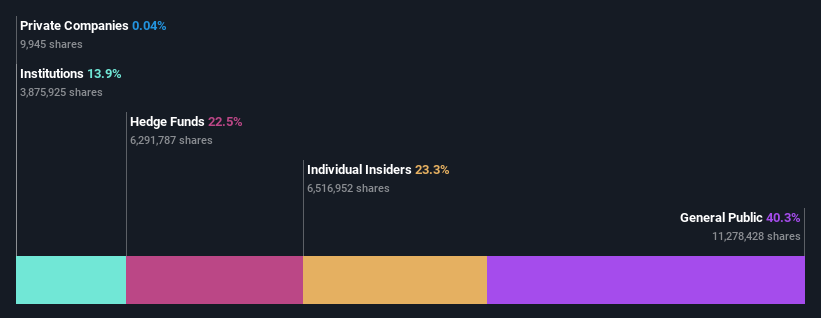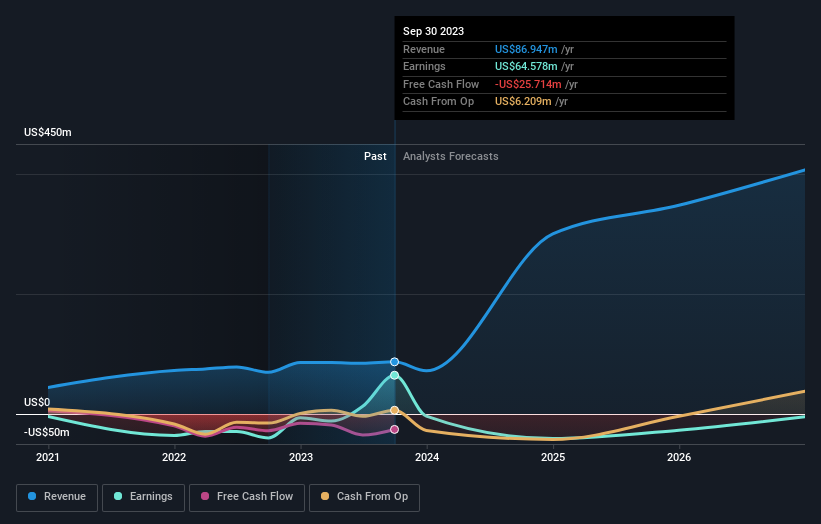- United States
- /
- Aerospace & Defense
- /
- NasdaqGM:LUNR
Intuitive Machines, Inc.'s (NASDAQ:LUNR) stock price dropped 39% last week; retail investors would not be happy

Key Insights
- Intuitive Machines' significant retail investors ownership suggests that the key decisions are influenced by shareholders from the larger public
- The top 6 shareholders own 50% of the company
- Insiders have sold recently
Every investor in Intuitive Machines, Inc. (NASDAQ:LUNR) should be aware of the most powerful shareholder groups. And the group that holds the biggest piece of the pie are retail investors with 40% ownership. That is, the group stands to benefit the most if the stock rises (or lose the most if there is a downturn).
While insiders who own 23% came under pressure after market cap dropped to US$596m last week,retail investors took the most losses.
Let's delve deeper into each type of owner of Intuitive Machines, beginning with the chart below.
View our latest analysis for Intuitive Machines

What Does The Institutional Ownership Tell Us About Intuitive Machines?
Institutions typically measure themselves against a benchmark when reporting to their own investors, so they often become more enthusiastic about a stock once it's included in a major index. We would expect most companies to have some institutions on the register, especially if they are growing.
As you can see, institutional investors have a fair amount of stake in Intuitive Machines. This implies the analysts working for those institutions have looked at the stock and they like it. But just like anyone else, they could be wrong. If multiple institutions change their view on a stock at the same time, you could see the share price drop fast. It's therefore worth looking at Intuitive Machines' earnings history below. Of course, the future is what really matters.

Our data indicates that hedge funds own 22% of Intuitive Machines. That worth noting, since hedge funds are often quite active investors, who may try to influence management. Many want to see value creation (and a higher share price) in the short term or medium term. The company's largest shareholder is Armistice Capital LLC, with ownership of 17%. For context, the second largest shareholder holds about 13% of the shares outstanding, followed by an ownership of 5.9% by the third-largest shareholder. Two of the top three shareholders happen to be Top Key Executive and Member of the Board of Directors, respectively. That is, insiders feature higher up in the heirarchy of the company's top shareholders.
On further inspection, we found that more than half the company's shares are owned by the top 6 shareholders, suggesting that the interests of the larger shareholders are balanced out to an extent by the smaller ones.
While studying institutional ownership for a company can add value to your research, it is also a good practice to research analyst recommendations to get a deeper understand of a stock's expected performance. There are a reasonable number of analysts covering the stock, so it might be useful to find out their aggregate view on the future.
Insider Ownership Of Intuitive Machines
The definition of company insiders can be subjective and does vary between jurisdictions. Our data reflects individual insiders, capturing board members at the very least. Company management run the business, but the CEO will answer to the board, even if he or she is a member of it.
Most consider insider ownership a positive because it can indicate the board is well aligned with other shareholders. However, on some occasions too much power is concentrated within this group.
Our information suggests that insiders maintain a significant holding in Intuitive Machines, Inc.. It has a market capitalization of just US$596m, and insiders have US$139m worth of shares in their own names. We would say this shows alignment with shareholders, but it is worth noting that the company is still quite small; some insiders may have founded the business. You can click here to see if those insiders have been buying or selling.
General Public Ownership
The general public-- including retail investors -- own 40% stake in the company, and hence can't easily be ignored. This size of ownership, while considerable, may not be enough to change company policy if the decision is not in sync with other large shareholders.
Next Steps:
I find it very interesting to look at who exactly owns a company. But to truly gain insight, we need to consider other information, too. For example, we've discovered 7 warning signs for Intuitive Machines (3 are significant!) that you should be aware of before investing here.
If you are like me, you may want to think about whether this company will grow or shrink. Luckily, you can check this free report showing analyst forecasts for its future.
NB: Figures in this article are calculated using data from the last twelve months, which refer to the 12-month period ending on the last date of the month the financial statement is dated. This may not be consistent with full year annual report figures.
New: AI Stock Screener & Alerts
Our new AI Stock Screener scans the market every day to uncover opportunities.
• Dividend Powerhouses (3%+ Yield)
• Undervalued Small Caps with Insider Buying
• High growth Tech and AI Companies
Or build your own from over 50 metrics.
Have feedback on this article? Concerned about the content? Get in touch with us directly. Alternatively, email editorial-team (at) simplywallst.com.
This article by Simply Wall St is general in nature. We provide commentary based on historical data and analyst forecasts only using an unbiased methodology and our articles are not intended to be financial advice. It does not constitute a recommendation to buy or sell any stock, and does not take account of your objectives, or your financial situation. We aim to bring you long-term focused analysis driven by fundamental data. Note that our analysis may not factor in the latest price-sensitive company announcements or qualitative material. Simply Wall St has no position in any stocks mentioned.
About NasdaqGM:LUNR
Intuitive Machines
Designs, manufactures, and operates space products and services in the United States.
High growth potential slight.

